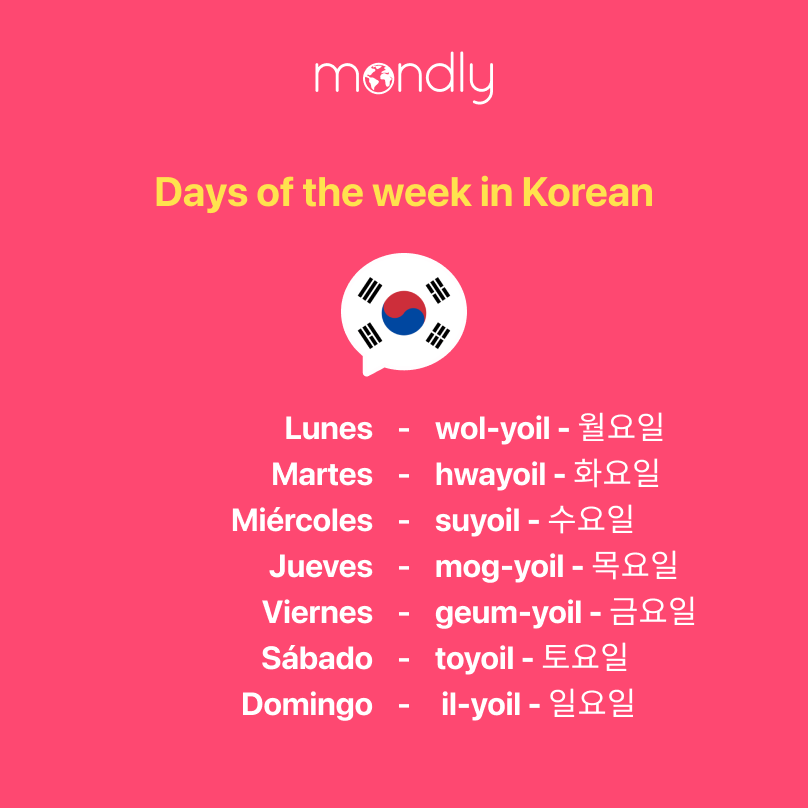The Best Way to Learn Korean Online – 6 Brilliant Resources
Forget about expensive Korean teachers and classes. The best way to learn Korean online is 10 times faster & cheaper. Here's what you have to
Do you want to learn Korean? Let’s start with the basics. Monday is 월요일.

Learning the days of the week in Korean is the best thing you can do if you recently became interested in learning Korean. Firstly, you’ll start small and that’s great! Like Rome, Seoul wasn’t built in a day. Nor your Korean vocabulary will ever be. Secondly, learning the days of the week is very practical and quite essential. Meetings, nights out, doctor appointments, reservations – will all happen on a certain day of the week. Last but not least, this basic Korean lesson will help you get a sense of how it feels to learn Korean. Does it fulfill you? Is this the right language for you? Do you want to continue and learn more or not?
Let’s get to it and find out.
In the table below you’ll find the days of the week in Korean together with their corresponding Romanization so you can learn how to pronounce them. If you wish to find out more about the Korean alphabet and how to read it, check out this quick guide to Hangul and its rules.
Practicing with the Mondly app can always help if you are not sure whether your pronunciation is on point or not.
The days of the week in Korean are:
| Days of the week in Korean | Days of the week in English |
|---|---|
| 월요일 (wol-yoil) | Monday |
| 화요일 (hwayoil) | Tuesday |
| 수요일 (suyoil) | Wednesday |
| 목요일 (mog-yoil) | Thursday |
| 금요일 (geum-yoil) | Friday |
| 토요일 (toyoil) | Saturday |
| 일요일 (il-yoil) | Sunday |
If you are a fan of BTS, Squid Game, or K-drama in general, it’s possible that some of the Korean weekdays sound familiar to you. However, to make sure they are completely glued into your brain, we are going to look at how these words were formed. Studying the etymology of a word or its formation can help you make associations and remember it faster. This little trick applies to any language, not just Korean.
As you can see, all days in Korean end in 요일 (’yoil’) which translates to ‘day’ in English. Now all that remains to be analyzed is a single Korean character at the beginning of each of the seven words. Here’s what each day in Korean means in English:
We can all agree that Koreans are right: Friday is indeed ‘gold’ and we all love it!
As a little bonus, here’s an image that may come in handy later. Save it or screenshot it and use it to practice what you’ve just learned.

If it’s all clear so far, let’s dive into some examples using the days of the week in Korean. This is a great exercise if you want to put things into context.
Do you want to see the Korean weekdays in action? Get Mondly, the award-winning language learning app that will help you speak Korean as if you were Seoul-born.
It can be really tricky to master the Korean pronunciation if you don’t actively live in South Korea. But with Mondly you’ll have access to a fast and highly efficient learning method that allows you to learn Korean naturally with:
Start using Mondly for free on your computer or download the app and learn Korean anytime, anywhere.

Forget about expensive Korean teachers and classes. The best way to learn Korean online is 10 times faster & cheaper. Here's what you have to

If you want to learn Hangul, you’re in the right place. 🫰

Thought red coveralls are going out of fashion? Think again.
So helpful thank you